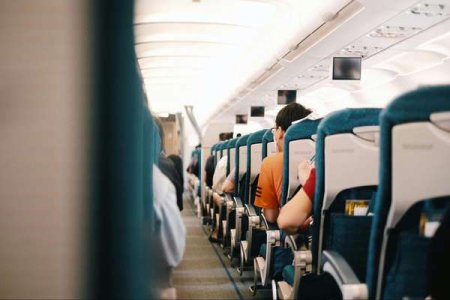Plus-size influencer's meltdown sparks major debate: Should airlines offer free extra seats?
The skies might be friendly, but the seats? Not so much, according to plus-size travel influencer Jaelynn Chaney. In a passionate plea that's gone viral, Chaney has reignited a fiery debate over whether airlines should provide extra seats to plus-size passengers at no additional cost. As the holiday travel season approaches, this conversation takes on new urgency, with many travelers feeling the pinch—literally—of shrinking airline seats.
The Crux of the Controversy
Chaney's argument hinges on the idea that larger passengers are unfairly penalized by having to purchase two seats to accommodate their size, effectively paying double for the same service that other passengers receive with a single ticket. She's not alone in her frustration. The issue of airline seating and policies for plus-size passengers has been a contentious topic for years, with many calling for more inclusive and fair practices.

The Canadian Model: One Person, One Fare
Chaney points to Canada's “one person, one fare” policy as a beacon of hope. Since 2008, Canadian airlines have been required by law to accommodate passengers who need extra space due to medical conditions, including obesity, without charging for an additional seat. This policy, however, requires passengers to provide medical documentation and surface measurements to qualify, a process that some find invasive and others see as a necessary step to ensure fairness.
The U.S. Stance and the Backlash
In contrast, the U.S. Department of Transportation does not mandate airlines to provide more than one seat per ticket, leaving airlines to set their own policies. This has led to a patchwork of practices, with some airlines offering the purchase of an extra seat as the only option for plus-size passengers seeking comfort.
Chaney's demands have sparked a spectrum of reactions. Critics argue that if a passenger occupies two seats, it's only fair they pay for both, as the airline cannot sell that seat to another customer. Others express empathy for the discomfort plus-size passengers face but question the logistics and fairness of implementing a policy like Canada's in the U.S.
The Personal Toll and the Push for Change
Chaney's advocacy is not just about policy—it's personal. She recounts distressing experiences, such as getting stuck in a revolving door at Chicago O'Hare airport and facing unhelpful airport staff. These incidents underscore the daily challenges plus-size individuals encounter while traveling.
Her call for action includes not only the provision of extra seats at no cost but also a streamlined process for refunds when plus-size passengers independently purchase additional space. Despite nearly 40,000 signatures on her petition and widespread media attention, U.S. airlines have yet to adopt such measures.

A Complex Issue with No Easy Answers
The debate over airline seating for plus-size passengers is complex, touching on issues of health, accessibility, economics, and social justice. It raises questions about the responsibility of airlines to accommodate all passengers and the extent to which they should adjust their business models to be more inclusive.
We understand that travel should be accessible and comfortable for everyone, regardless of size. We also recognize the need for fair business practices and the challenges airlines face in balancing customer satisfaction with profitability.

Have you or someone you know faced similar challenges while flying? What are your thoughts on the “one person, one fare” policy? Should airlines in the US adopt similar measures to accommodate plus-size passengers? Share your thoughts, experiences, and questions in the comments below.
The Crux of the Controversy
Chaney's argument hinges on the idea that larger passengers are unfairly penalized by having to purchase two seats to accommodate their size, effectively paying double for the same service that other passengers receive with a single ticket. She's not alone in her frustration. The issue of airline seating and policies for plus-size passengers has been a contentious topic for years, with many calling for more inclusive and fair practices.

Advocacy takes flight: Plus-size travelers are raising awareness about equitable policies that respect dignity and accessibility. Image Source: Jerry Wang / Pexels.
The Canadian Model: One Person, One Fare
Chaney points to Canada's “one person, one fare” policy as a beacon of hope. Since 2008, Canadian airlines have been required by law to accommodate passengers who need extra space due to medical conditions, including obesity, without charging for an additional seat. This policy, however, requires passengers to provide medical documentation and surface measurements to qualify, a process that some find invasive and others see as a necessary step to ensure fairness.
The U.S. Stance and the Backlash
In contrast, the U.S. Department of Transportation does not mandate airlines to provide more than one seat per ticket, leaving airlines to set their own policies. This has led to a patchwork of practices, with some airlines offering the purchase of an extra seat as the only option for plus-size passengers seeking comfort.
Chaney's demands have sparked a spectrum of reactions. Critics argue that if a passenger occupies two seats, it's only fair they pay for both, as the airline cannot sell that seat to another customer. Others express empathy for the discomfort plus-size passengers face but question the logistics and fairness of implementing a policy like Canada's in the U.S.
The Personal Toll and the Push for Change
Chaney's advocacy is not just about policy—it's personal. She recounts distressing experiences, such as getting stuck in a revolving door at Chicago O'Hare airport and facing unhelpful airport staff. These incidents underscore the daily challenges plus-size individuals encounter while traveling.
Her call for action includes not only the provision of extra seats at no cost but also a streamlined process for refunds when plus-size passengers independently purchase additional space. Despite nearly 40,000 signatures on her petition and widespread media attention, U.S. airlines have yet to adopt such measures.

As airline seats shrink, conversations about passenger comfort and inclusivity grow louder. Is it time for a change in policy? Image Source: Nguyendesigner / Pexels.
A Complex Issue with No Easy Answers
The debate over airline seating for plus-size passengers is complex, touching on issues of health, accessibility, economics, and social justice. It raises questions about the responsibility of airlines to accommodate all passengers and the extent to which they should adjust their business models to be more inclusive.
We understand that travel should be accessible and comfortable for everyone, regardless of size. We also recognize the need for fair business practices and the challenges airlines face in balancing customer satisfaction with profitability.
Key Takeaways
- Plus-size travel influencer Jaelynn Chaney is advocating for U.S. airlines to adopt Canada's "one person, one fare" policy, which would provide extra seats for plus-sized passengers at no additional cost.
- Chaney argues that current U.S. airline policies unfairly force plus-sized passengers to pay for two seats, effectively penalizing them for their size, and calls this practice discriminatory.
- Canada's "one person, one fare" policy, enacted in 2008, requires airlines to accommodate passengers with special needs, including obesity, without charging for an additional seat, provided passengers supply medical documentation.
- Some critics on social media disagree with Chaney's stance, asserting that passengers occupying two seats should pay for both, while Chaney continues to advocate for fair treatment and equal comfort for all flyers, regardless of size.
Have you or someone you know faced similar challenges while flying? What are your thoughts on the “one person, one fare” policy? Should airlines in the US adopt similar measures to accommodate plus-size passengers? Share your thoughts, experiences, and questions in the comments below.






